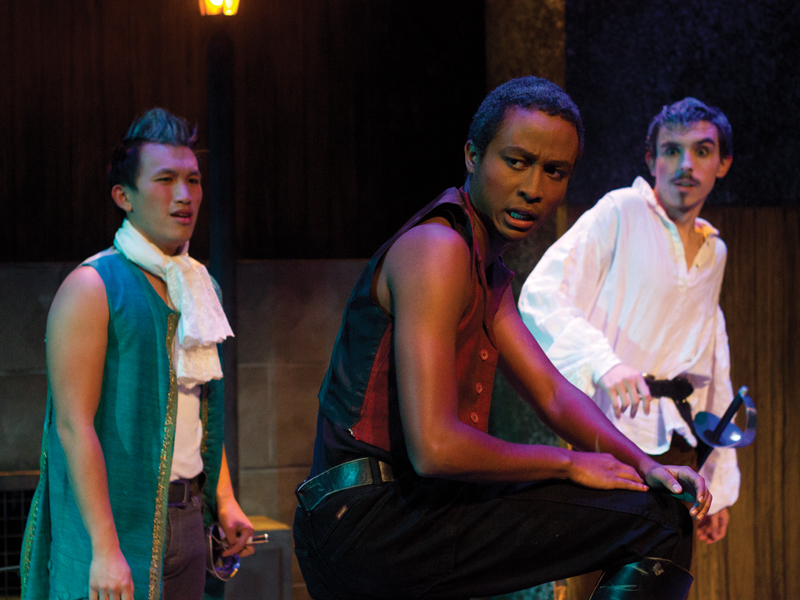
The UCR theatre department’s attempt to modernize “The Rover,” a 1677 play written by Aphra Behn, fell short of capturing the attention of its audience. While the play was not terribly dull or uninteresting, the language barrier between this traditional old-English piece was quite the stumper due to the diction with which this play was written.
“The Rover” is about a group of men trying to find their pick of women in the streets of Italy during Carnival, showing the confinement of women at this time and a blaring realization of the societal norms that still follow our daily lives. The play explored the relationships between characters, the desire of women to be free and the desire for male characters to find the right woman. The ultimate message explores the role that women played in society at the time –– but this was not obvious to the audience from the get-go.
The play was much more fast-paced than I would expect from a play in that time period. With prostitution, love and sword fighting, it was unexpectedly entertaining. However, while it did succeed in keeping me awake, I felt as if I was watching without context — seeing ornate colors and set pieces, but not knowing what they meant. The play’s language was too old and difficult to understand, with a simplistic plot and theme that was not readily known. Part of the confusion was due to the inability to see the true intent behind all the action, which the playwright disguised amidst the dawdling of the male characters.
The scenery, designed by Haibo Yu, was remarkable and clearly conveyed the locations. The set felt distinctly rustic and seemed like the old streets of that time period. However, much of the set was reused as different locations, proving confusing at times to actually know where the characters really were. For instance, many times they were out and about on the streets, where they encounter a courtesan’s house, but in a later scene, the same area was used as another character’s home.
The costumes, while elegant, were not entirely true to the era in which the play was set. Many of the costumes worn by the female cast had shortcomings, with seemingly half-finished dresses that didn’t wrap around their waists completely and awkward-looking hoop skirt outlines that were probably supposed to represent full, flowing dresses. The costumes as a whole were quite extravagant and colorful, but the loss of the full effect for every actress brought me away from the historical context that was being portrayed.
The lighting and sounds were good, but many times the sounds and music came in too early or went out too late, occasionally covering the dialogue that was occurring in the scene. While much of the scenic lighting was done very well, the portrayal of some of the scenes was a stretch. When the play was supposed to be set at night, the lights portrayed an illuminated darkness. The darkness and the inability to see each other was occasionally used in the source material, but it was not nearly dark enough on the stage to sell the realism of that occurrence.
The actors were overall varied in acting ability and mostly good, but some seemed to be stiff and awkward, delivering their lines and actions with much less gusto than other cast members. There were many great actors that portrayed their characters well with the drama and seriousness of what the play tried to convey, such as Ned Blunt (Fernando Echeverria). His character was believable due to his well-portrayed debaucherous behavior and many powerful scenes conveying his hopeless romantic personality.
“The Rover” was a good attempt, but ultimately failed to provide much context of what was being said. After thinking hard about what the play was about, watching it again and then finally understanding the message, I realized the source material of the play was the cause of this misperception. The play was just not a good choice for a college audience, and although it is not terrible, it is quite difficult for anyone to understand it. I highly recommend this play for those who desire a blast from the way-old past, but if you have never understood works by the likes of Shakespeare and others of his era, then I cannot be certain that this is worth your time.
Rating: 3.5 stars








